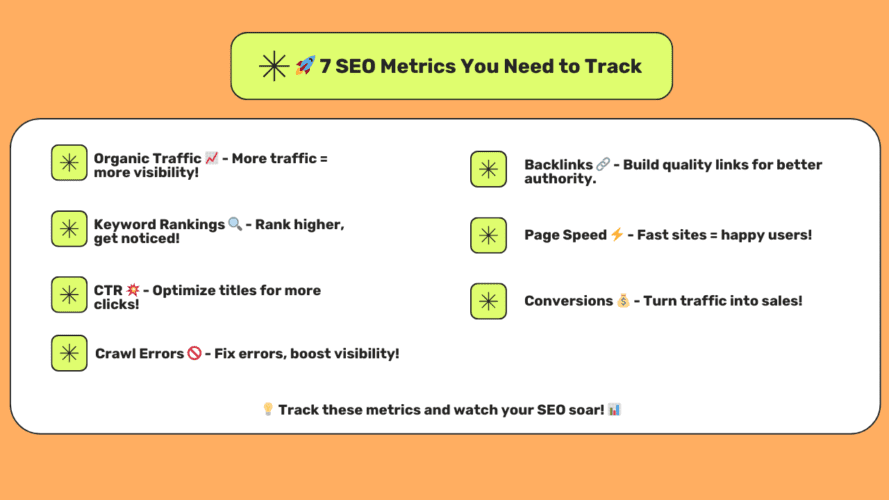Introduction
In the ever-evolving world of digital marketing, understanding and measuring the right SEO metrics is critical for success. These metrics provide valuable insights into your website’s performance, helping you refine strategies and achieve your goals. By focusing on the right metrics, you can attract more traffic, boost your rankings, and drive conversions effectively. This blog will explore the seven essential SEO metrics you should prioritize to optimize your website and deliver measurable results.
1. Organic Traffic
Organic traffic refers to visitors coming to your website through unpaid search results. It’s a direct indicator of how well your content ranks and resonates with your target audience.
Why It Matters:
Higher organic traffic means better visibility, stronger brand presence, and an increased chance of conversions.
How to Track:
Google Analytics is an excellent tool for monitoring traffic trends and identifying pages driving the most visitors.
Example:
Imagine you publish a blog on “Healthy Meal Prep Ideas,” and traffic spikes significantly. This indicates your content aligns well with user interests and search intent.
2. Keyword Rankings
Keyword rankings reflect where your targeted keywords appear in search results. It’s a critical metric for evaluating your SEO strategy’s effectiveness.
Why It Matters:
Better rankings for relevant keywords lead to increased visibility and clicks.
How to Track:
Tools like SEMrush, Ahrefs, or Google Search Console can monitor keyword positions and trends.
Example:
If your page for “best yoga mats” improves from rank #12 to #3, your chances of attracting buyers increase significantly.
3. Click-Through Rate (CTR)
CTR measures how often users click on your link when it appears in search results. This metric indicates the effectiveness of your meta titles and descriptions.
Why It Matters:
Low CTR could signal unappealing or irrelevant titles and descriptions.
How to Improve:
Craft engaging, benefit-driven meta titles and descriptions. Highlight value propositions to entice users.
Example:
Changing “Simple Budgeting Tips” to “7 Simple Budgeting Tricks to Save $1,000 Fast” can double your CTR.
4. Backlinks
Backlinks are external links pointing to your site from other websites. Their quality and relevance significantly influence your domain authority and rankings.
Why It Matters:
High-quality backlinks build trust, enhance your website’s credibility, and improve search engine rankings.
How to Track:
Tools like Ahrefs, Moz, or Google Search Console allow you to monitor backlink profiles and their quality.
Example:
When a reputable food blogger links to your restaurant’s website, it improves your local SEO and boosts visibility.
5. Page Speed & Core Web Vitals
Page speed measures how quickly your site loads, while Core Web Vitals assess user experience metrics like Largest Contentful Paint (LCP), First Input Delay (FID), and Cumulative Layout Shift (CLS).
Why It Matters:
Fast-loading sites enhance user satisfaction, reduce bounce rates, and rank higher on search engines.
How to Improve:
Use tools like Google PageSpeed Insights to identify performance issues, such as large images or excessive JavaScript.
Example:
Compressing images on your e-commerce site can reduce load time, leading to a 15% increase in sales.
6. Organic Conversions
Organic conversions track the number of leads, sign-ups, or sales generated from organic traffic. This metric connects traffic performance with tangible business outcomes.
Why It Matters:
Traffic without conversions doesn’t drive growth. This metric ensures your SEO efforts align with business objectives.
How to Improve:
Focus on aligning content with user intent, optimizing landing pages, and creating clear calls to action (CTAs).
Example:
A software company optimized its “free trial” page and increased its conversion rate from 5% to 10%.
7. Crawl Errors
Crawl errors occur when search engines fail to access your website’s pages, hindering their ability to rank.
Why It Matters:
Pages that search engines can’t crawl won’t appear in search results, wasting your SEO efforts.
How to Fix:
Google Search Console helps identify and resolve crawl errors such as broken links or server issues.
Example:
Fixing a broken link on your “services” page restored its ranking and significantly increased user inquiries.
The Key to SEO Success: Mastering Essential Metrics
In the competitive landscape of digital marketing, tracking the right metrics is not just an option—it’s a necessity. Metrics serve as the guiding light, offering insights into your website’s performance and showing you the path to growth. Without consistent tracking, even the most robust strategies can fall short. So, what are these crucial metrics, and why are they indispensable for SEO success? Let’s break it down.
Essential Metrics for SEO Success
- Organic Traffic
Organic traffic represents the visitors arriving at your site via unpaid search results. It’s a direct indicator of your site’s visibility and how effectively it meets user needs. The more organic traffic you have, the better your site is performing in search engines. Regularly monitoring this metric helps you understand the impact of your SEO efforts and identify opportunities for growth. - Keyword Rankings
Keyword rankings show where your site stands in search results for specific terms. High keyword rankings mean greater visibility and higher chances of attracting clicks. Tracking this metric allows you to refine your keyword strategy, ensuring your content aligns with user intent and search engine algorithms. - Click-Through Rate (CTR)
CTR measures the percentage of users who click on your link after seeing it in search results. A low CTR might indicate that your titles or meta descriptions need optimization. By improving this metric, you can attract more visitors without changing your rankings, making it a critical measure of user engagement. - Backlinks
Backlinks are one of the most influential SEO factors. They act as endorsements from other websites, signaling trust and authority to search engines. Monitoring your backlink profile helps you assess your site’s credibility and identify areas where you can build stronger relationships with other domains. - Page Speed and Core Web Vitals
User experience is a cornerstone of SEO, and page speed plays a significant role in keeping users engaged. Core Web Vitals—metrics like Largest Contentful Paint (LCP), First Input Delay (FID), and Cumulative Layout Shift (CLS)—help measure your site’s performance and ensure it meets user expectations. Sites that load quickly and provide a seamless experience rank higher and retain more visitors. - Organic Conversions
Driving traffic is only half the battle; converting that traffic into meaningful actions is what truly matters. Organic conversions track leads, sign-ups, or sales generated from organic traffic. This metric ties your SEO efforts directly to business outcomes, ensuring your strategy aligns with your goals. - Crawl Errors
Crawl errors occur when search engines fail to access your site’s pages, preventing them from being indexed. These errors can undermine your SEO efforts and reduce your site’s visibility. Regularly checking and resolving crawl errors ensures that all your valuable content is accessible to search engines.
What You’ll Gain From Tracking SEO Metrics
- Actionable Insights: By monitoring these metrics, you’ll gain a clear understanding of what’s working and what needs improvement on your site.
- A Data-Driven Strategy: Metrics provide the foundation for informed decisions, helping you refine your approach and allocate resources effectively.
- Improved Rankings: Tracking and optimizing for these metrics will enhance your site’s visibility, making it easier for users to find you.
- Traffic Growth: With better rankings and optimized content, you’ll see a steady increase in organic traffic.
- Higher Conversions: By aligning your SEO strategy with user intent, you’ll turn visitors into loyal customers or engaged leads.
Simplify SEO With Consistent Tracking
SEO might seem daunting, but it doesn’t have to be. By focusing on these seven metrics, you can transform your strategy into a systematic, results-oriented process. Think of these metrics as your ultimate SEO checklist—something you can rely on to ensure you’re on the right track.
Start tracking your site’s performance today, and unlock its full potential. With consistent effort and the right insights, you’ll not only improve your rankings but also achieve tangible growth in traffic and conversions. SEO isn’t just a tool; it’s a growth engine waiting to be put to work for you.
Conclusion
SEO metrics provide the foundation for an effective digital marketing strategy. By regularly tracking these seven key SEO metrics, you can uncover insights to optimize your website, improve rankings, and drive sustainable growth. Whether you’re aiming for better organic traffic, higher conversions, or enhanced user experience, these metrics are your roadmap to success. Start tracking them today and watch your website’s performance soar!
FAQ
1. What Are SEO Metrics and Why Are They Important?
SEO metrics are data points that measure your website’s performance in search engines, helping you understand how well your strategies are working. These include organic traffic, keyword rankings, click-through rate (CTR), and backlinks. By tracking these metrics, you gain insights into areas that need improvement, ensuring your SEO efforts drive measurable results. For example, monitoring SEO performance tracking helps align your strategy with business goals, leading to better rankings and conversions.
2. How Can I Track Organic Traffic Metrics Effectively?
Organic traffic metrics indicate how many users visit your website via search engines. Tools like Google Analytics provide in-depth insights into traffic sources, user behavior, and high-performing pages. By analyzing these metrics regularly, you can identify which content resonates with your audience. For instance, tracking organic traffic helps ensure your SEO metrics for success are aligned with your overall marketing strategy.
3. Why Are Keyword Rankings Vital for SEO?
Keyword rankings show where your website appears in search results for specific terms. Higher rankings lead to more visibility and clicks, directly impacting organic traffic and conversions. Regularly tracking key SEO metrics, including keyword rankings, ensures your content remains competitive. Tools like SEMrush and Ahrefs can help monitor ranking fluctuations and identify opportunities for improvement.
4. What Is Click-Through Rate (CTR) and How Can I Improve It?
CTR measures the percentage of users who click on your website link after seeing it in search results. A low CTR could indicate unappealing meta titles or descriptions. To improve CTR, focus on SEO performance tracking and optimize your metadata by highlighting value propositions and using actionable language. For example, a compelling title like “10 Simple Budgeting Tips to Save $1,000” can significantly increase clicks.
5. How Do Backlinks Impact SEO Performance?
Backlinks are links from other websites pointing to your site. They signal trust and authority to search engines, which improves rankings. High-quality backlinks are a critical component of key SEO metrics, as they boost your domain authority and visibility. Tools like Moz and Ahrefs allow you to analyze your backlink profile, ensuring your strategy focuses on building meaningful connections with reputable websites.
6. What Are Core Web Vitals, and Why Are They Important for SEO?
Core Web Vitals are metrics that measure user experience, including Largest Contentful Paint (LCP), First Input Delay (FID), and Cumulative Layout Shift (CLS). These metrics are part of SEO performance tracking and influence search rankings. By optimizing page speed insights, you can enhance user satisfaction, reduce bounce rates, and achieve better rankings. For example, compressing images and minimizing JavaScript files can significantly improve your Core Web Vitals scores.
7. How Can I Increase Organic Conversions Through SEO?
Organic conversions measure the actions users take, such as making a purchase or signing up, after arriving via organic traffic. To boost conversions, focus on aligning content with user intent and providing clear calls to action. Monitoring organic conversions ensures that your traffic translates into tangible business results. For instance, optimizing a “free trial” page can improve sign-up rates and overall engagement.
8. What Are Crawl Errors and How Do They Affect SEO?
Crawl errors occur when search engines cannot access certain pages on your website. These errors hinder indexing, reducing visibility and rankings. Use tools like Google Search Console to detect and fix crawl errors, such as broken links or server issues. Addressing these errors is essential for maintaining strong SEO metrics for success and ensuring that search engines can access all your valuable content.
9. What Is the Best Way to Perform SEO Performance Tracking?
SEO performance tracking involves monitoring key metrics such as organic traffic metrics, keyword rankings, CTR, and backlink analysis. Use tools like Google Analytics, SEMrush, and Ahrefs to gather data and identify trends. Regular tracking helps you make informed decisions, optimize strategies, and achieve better rankings, traffic, and conversions. Creating a comprehensive SEO checklist metrics ensures consistent monitoring and growth.
10. How Can I Optimize My Website Using These SEO Metrics?
To optimize your website, start by identifying areas of improvement through SEO metrics like page speed, organic conversions, and keyword rankings. Implement changes such as compressing images, refining metadata, and aligning content with user intent. Regularly monitor page speed insights and backlink analysis to ensure your site meets user expectations and search engine requirements. With a focus on these SEO metrics for success, your site will deliver better results over time.


